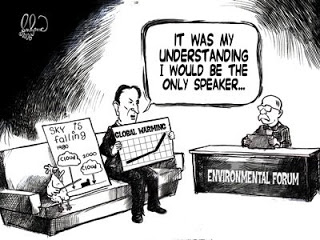Way down at the bottom of the alphabetically ordered list is the name of Edward T. Wimberley, Ph.D., Florida Gulf Coast University.
Wimberley, a professor of ecological studies, is one of more than 100 scientists from across the country and Canada whose names are on a newspaper advertisement proclaiming President Obama’s recent statements about climate change are bunk.
“I’m on a list of scientists and environmentalists who don’t believe that carbon dioxide is a major cause of global warming,” Wimberley said. “I’m one of the dissenters. You know: Those people who don’t exist. Al Gore says there’s no dissent about global warming, but there’s huge dissent among people who say, ‘Wait, the carbon dioxide theory doesn’t work.'”
Paid for by the Cato Institute, the ad ran Monday in the New York Times, Washington Post, Washington Times, Chicago Tribune and Los Angeles Times.
At the top of the ad is a Nov. 18, 2008, statement by Obama:
“Few challenges facing America and the world are more urgent than combating climate change. The science is beyond dispute and the facts are clear.”
That’s followed by a paragraph stating “the case for alarm regarding climate change is grossly overstated” and computer models “abjectly fail to explain recent climate behavior.”
Then comes a list of 115 scientists.
“The reason I signed is simple: I’m just not convinced by the research that carbon dioxide is a major problem,” Wimberley said. “If I thought it was, I wouldn’t have signed it.”
Wimberley, who has degrees in psychology, theology, health and mental health, and public administration, keeps an online Global Warming Resource Archive that contains hundreds of scientific articles on climate change.
“These are articles by climatologists, biologists, astrophysicists from around the world who are saying, ‘Wait a minute. This is poppycock,'” Wimberley said. “I think a lot of folks who do environmental science are swayed by political agendas. A lot of good folks I know have good sense about science until it comes to this issue.”
Rather than warming, the world is in a cooling trend, Wimberley said.
Admitting he’s not an expert on global warming, Andrew McElwaine, president of the Conservancy of Southwest Florida, said, “In terms of living in Southwest Florida, I hope he’s right. I’m afraid he’s wrong, but the alternative is not good.”
Ai Ning Loh, FGCU associate professor of marine science, said the world is definitely not cooling.
“That’s his personal view, and I don’t agree with that view,” she said. “I can speak to carbon models in the ocean, and there is warming. It is man-made.”
Behind global warming theories, Wimberley said, is the United Nations.
“The folks involved with the United Nations and many that support this are looking to a future world less governed by nations and more governed by international bodies,” he said. “They’re interested in strengthening the power of the United Nations. Nothing legitimizes that more than a global crisis.
“The whole world is going to hell. We’ll be flooded out of here in Southwest Florida. That kind of threat justifies extraordinary power and authority.”
Anne Hartley, FGCU an associate professor of environmental studies who teaches a class in global warming, did not buy the United Nations argument.
The science of climate change involves many disciplines, Hartley said, including climate science, paleo-climatology, atmospheric science, marine science and terrestrial ecology.
“You have to listen to a range of scientists,” Hartley said. “It’s important to look at the best available science and draw conclusions from that. The best available science is published by the IPCC (Intergovernmental Panel on Climate Change). Those who believe the United Nations is involved in a conspiracy are frankly politically motivated.”
Despite the number of scientists whose names are on the newspaper ad, Wimberley said it will be ignored.
“We’re not the first rodeo of scientists coming together and saying, ‘C’mon,'” he said. “I know my colleagues think I’m sipping the Kool-Aid, if not gulping it.”
